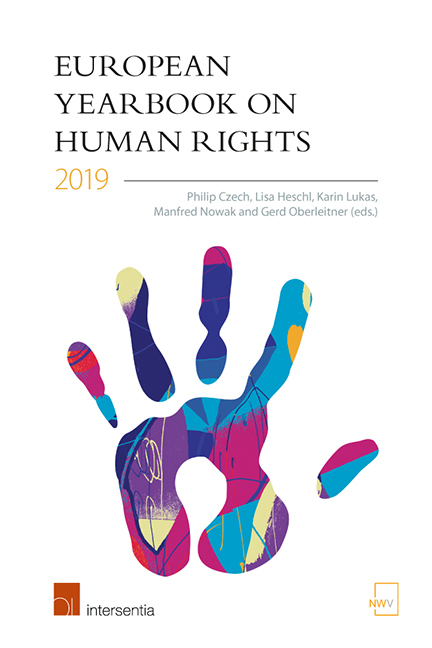Book contents
- Frontmatter
- Miscellaneous Frontmatter
- Editors’ Preface
- Contents
- List of Abbreviations
- List of Contributors
- PART I TOPIC OF THE YEAR
- PART II EU
- PART III CoE
- PART IV OSCE
- Pioneer Decision on Safety of Journalists in the Preceding Context
- If I Could I Would? International Electoral Standards and the Recommendations of Election Observers
- The Right to Political Participation of Persons with Disabilities
- The Right of Children to be Heard through Peaceful Protests
- PART V REPORTS FROM THE FIELD
- PART VI OTHERS
- PART VII BOOK REVIEWS
- Index
The Right of Children to be Heard through Peaceful Protests
from PART IV - OSCE
Published online by Cambridge University Press: 24 January 2020
- Frontmatter
- Miscellaneous Frontmatter
- Editors’ Preface
- Contents
- List of Abbreviations
- List of Contributors
- PART I TOPIC OF THE YEAR
- PART II EU
- PART III CoE
- PART IV OSCE
- Pioneer Decision on Safety of Journalists in the Preceding Context
- If I Could I Would? International Electoral Standards and the Recommendations of Election Observers
- The Right to Political Participation of Persons with Disabilities
- The Right of Children to be Heard through Peaceful Protests
- PART V REPORTS FROM THE FIELD
- PART VI OTHERS
- PART VII BOOK REVIEWS
- Index
Summary
ABSTRACT
In 2019 the world is celebrating the 30th anniversary of the adoption of the United Nations (UN) Convention on the Rights of the Child. The UN Convention on Rights of the Child (CRC) – the most widely adopted binding human rights instrument in the world – includes autonomy rights specific to children. It recognised the right of children capable of forming their own views to express those views freely in all matters affecting them (Article 12(1)). The Convention also includes provisions specifically relevant for the expression and acting upon their interests, such as the right to freedom of expression (Article 13), the rights to freedom of association and to freedom of peaceful assembly (Article 15) or right to access to appropriate information (Article 17). Protest is particularly important for children, who are, for the most part, without the right to vote, and therefore have fewer avenues than adults through which to assert their interests. Children have and can make a positive contribution to their societies and adolescents often want to have their voices heard through protests. Although there appears to be a growing number of assemblies relating to issues affecting children and seeing adolescents among assembly organisers or participants is more and more common in many countries, the particular needs that must be met to allow them to fully enjoy their rights are often neglected. The need to protect the ‘best interest’ of the children based on their special needs and vulnerabilities is enshrined in the Convention and both the CRC and the International Covenant on Civil and Political Rights (ICCPR) acknowledged the special status of children. Children have particular needs in the context of protests that are different to those of adults. The Committee on the Rights of the Child has emphasised the positive obligation of States to facilitate children in exercising freedom of assembly, the obligation to ensure that officials implement children's protest rights, and the obligation to refrain from considering the safety of children at demonstrations to be a matter solely for parents. The contribution aims to explore the positive obligations of the State to protect, promote and fulfil the right of children to assemble peacefully and be heard through protests.
INTRODUCTION AND OVERVIEW
Freedom of peaceful assembly is a foundation of any democratic society.
- Type
- Chapter
- Information
- European Yearbook on Human Rights 2019 , pp. 405 - 416Publisher: IntersentiaPrint publication year: 2019



